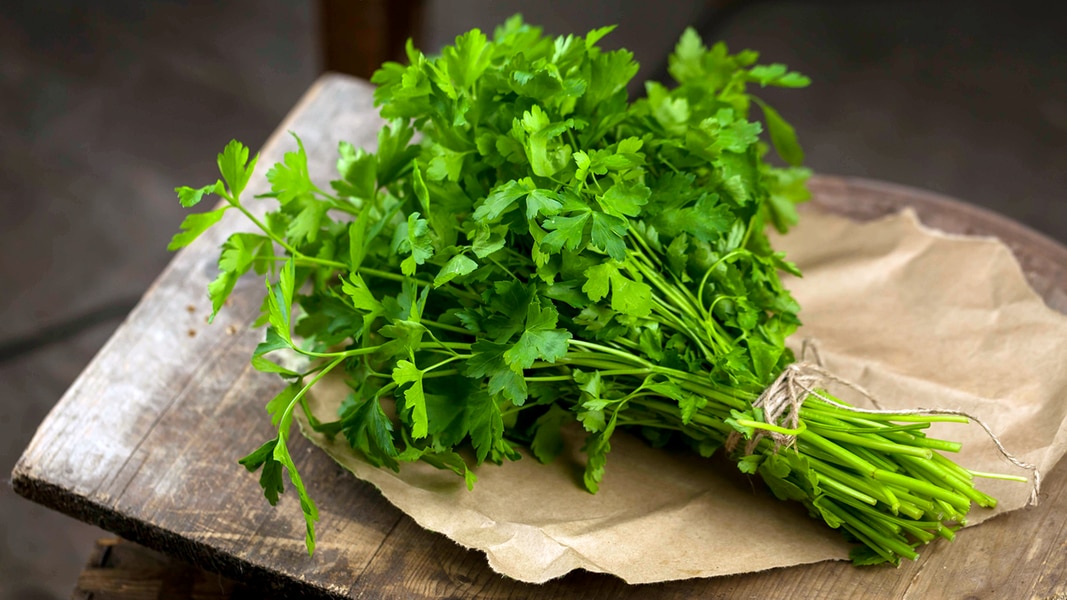Status: 06/30/2023 09:04 a.m
Parsley has many uses as a medicinal plant. It works against bad breath, high blood pressure, bacteria and mold as well as gastrointestinal complaints and urinary tract infections and is also used in gynecology.
Like coriander and cumin, parsley, which is mainly found in Europe and the Mediterranean region, belongs to the umbelliferae family. Their fresh taste and the bright green color of their leaves make them a popular decorative herb. But it was known as a medicinal plant long before that: as early as ancient times and the Middle Ages, healers used “parselwort” to treat stomach and intestinal problems, urinary tract infections, menstrual and menopausal problems.
Lots of healthy ingredients
Parsley contains many ingredients that have a positive effect on health.
Vitamins: Parsley contains more immune-boosting vitamin C than citrus fruits, plus eye-important beta-carotene (provitamin A) and vitamin E, which protects cells from free radicals and aging. Parsley also contains vitamin K and folic acid, which are important for blood clotting. Minerals: Iron and zinc are essential trace elements. Iron is important for the transport of oxygen and the formation of red blood cells, zinc for many metabolic processes and potency. Parsley also contains magnesium, calcium and potassium. Essential oils: Essential oils have a slightly anti-inflammatory and digestive effect, often help against stomach and intestinal problems, can bind harmful substances in cigarette smoke and thus protect the lungs. The green apiol and the phenylpropanoid myristicin are also said to suppress cravings. Phytoestrogens: Parsley also contains plant hormones, including a plant variant of the female sex hormone estrogen called a phytoestrogen. This makes parsley interesting for gynecology, to alleviate menstrual or menopausal symptoms or to induce childbirth.
Protection against urinary tract infections
Parsley is one of the draining medicines (diuretics) and ensures that the kidneys, ureters and bladder are flushed out thoroughly. This prevents the formation of kidney stones and bladder stones as well as inflammation and facilitates the elimination of toxins and bacteria.
Relieve menstrual cramps with parsley
The phytoestrogens and essential oils in parsley can help with both urinary tract infections and menstrual cramps. The herbal hormones ensure increased contraction of the uterus, which can initiate missed menstrual periods and relieve cramps. In obstetrics, parsley has played an important role since ancient times in initiating complicated births and also in terminating unwanted pregnancies.
Parsley helps with indigestion
Parsley supports the gastrointestinal tract, helps to process hard-to-digest foods and release valuable nutrients from food. The medicinal plant can also be helpful for flatulence and cramps. This benefits, for example, people with chronic stomach and intestinal diseases such as irritable bowel syndrome, celiac disease or lactose intolerance.
Lower blood pressure with parsley
Thanks to its draining effect, parsley not only helps bladder infections or kidney stones to heal faster or even prevent them, but can also lower high blood pressure. It also influences the production of hormones that are responsible for the increase in blood pressure.
Parsley against bad breath
With its essential oils and the green plant pigment chlorophyll, parsley also provides relief from annoying bad breath. Together they have an antibacterial effect and drive away the germs that are responsible for the smell. They also ensure a fresh aroma on the tongue.
Risks and side effects of parsley in pregnancy
In larger quantities, parsley can increase the contraction of the uterus, which can be desirable if there is no menstrual bleeding or to induce an overdue birth. However, this contraction-promoting effect can also be dangerous for pregnant women, because it is so strong that it can also lead to miscarriages. Pregnant women should therefore not eat large quantities of parsley. As a herb with a few grams per day, however, it is unproblematic.
Parsley is poisonous plant of the year 2023
The botanical garden in Hamburg Wandsbek has chosen parsley as poisonous plant of the year 2023. The reason is the apiol, a component of the essential oil of parsley. After flowering, in the second year of its cultivation, the apiol content increases tenfold, also accumulating in stems and leaves. Therefore, one should not harvest parsley after it has flowered. Garden owners are advised to replant the parsley every year to be on the safe side.
Do not combine parsley with diuretics
Anyone taking dehydrating medication (diuretics), for example for high blood pressure or urinary tract problems, should be careful with parsley, because the medicinal plant could increase the effect of the medication and lead to a nutrient deficiency.
experts on the topic
Institute for Social Medicine, Epidemiology and Health Economics
Charité – University Medicine Berlin
Chief Physician Department of Naturopathy
Immanuel Hospital Berlin, Berlin-Wannsee location
Koenigstrasse 63
14109 Berlin
pharmacist
Rathausstrasse 11
22941 Bargteheide
Further information
Dandelion relieves indigestion and can help with weight loss. The entire plant is edible. more
Juniper berries not only have a long tradition as a spice or in gin, but also as a remedy. more
Thyme is a versatile medicinal plant: It has a strengthening effect and helps with cold symptoms, among other things. more
This topic in the program:
Visit | 04.07.2023 | 8:15 p.m
